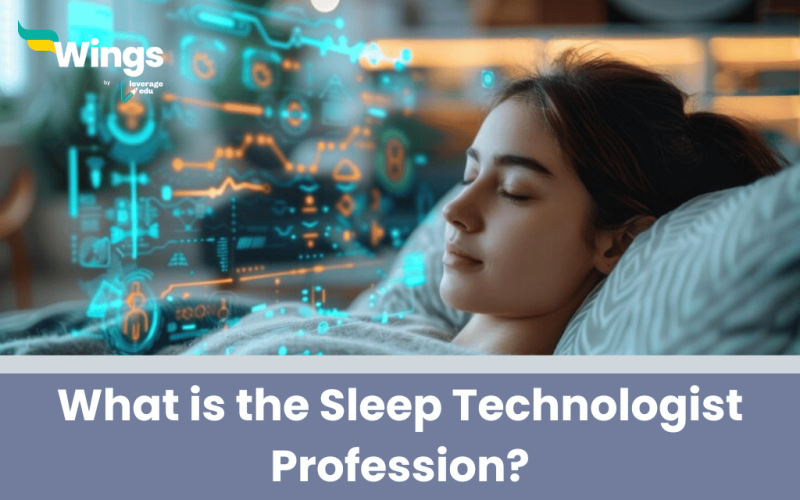Do you ever wonder what happens behind the scenes when you head to a sleep lab for a study? Millions of adults struggle with sleep disorders, and sleep technicians are the unsung heroes working late nights to help them get the answers they need. This blog is your one-stop shop for all things sleep tech! We’ll get into the fascinating world of sleep studies, explore the role of sleep technicians, and shed light on the often mysterious world of sleep disorders. Whether you’re curious about a career in sleep medicine or simply want to understand your own sleep patterns better, pull up a blanket and join us on this journey to a good night’s sleep!
| Category | Description |
| Preparing sleep studies | Set up equipment, sanitize rooms, prepare for patients |
| Conducting sleep studies | Attach monitors, and track physiological data during sleep |
| Contribution | Provide doctors with a clear picture of patient’s sleep for accurate diagnosis & treatment |
This Blog Includes:
Why should you become a Sleep Technologist?
If you’re looking for a career that’s both interesting and helps people improve their lives, then becoming a sleep technologist could be a perfect fit! The reasons behind it are numerous but let’s focus on the important ones so firstly, this field offers the chance to directly impact people’s well-being. Sleep disorders like sleep apnea can rob people of energy, focus, and even good health. By conducting sleep studies, you play a crucial role in diagnosing these issues. Imagine the satisfaction of knowing you helped someone finally get a good night’s rest and wake up feeling refreshed!
Secondly, the job offers a unique blend of science and human interaction. You’ll learn about sleep stages, how to use specialized equipment and analyze data. But you’ll also interact with patients, explaining procedures, ensuring their comfort, and answering their questions. It’s a chance to combine your scientific curiosity with a desire to help others.
Thirdly, the field of sleep medicine is constantly evolving. New technologies and treatments are emerging all the time. As a sleep technologist, you’ll have the opportunity to stay at the forefront of these advancements, keeping your skills sharp and your job intellectually stimulating.
Finally, the job market for sleep technologists is growing. With increasing awareness of sleep disorders, the demand for qualified professionals is on the rise. This means job security and the potential for career advancement. So, if you’re fascinated by sleep, enjoy helping people, and have a knack for science and technology, then becoming a sleep technologist could be the key to unlocking a rewarding and exciting career.
Know about How to Become a Scientist in NASA
What are the Benefits of Becoming a Sleep Technologist?
There are many benefits to becoming a sleep technologist, making it a great career choice for those who are interested in the field. Here are some of the top reasons to consider becoming a sleep technologist:

Make a real difference in people’s lives
Sleep disorders can have a significant impact on a person’s health and well-being. By helping to diagnose these disorders, sleep technologists play a crucial role in improving people’s quality of life. Imagine the satisfaction of knowing you helped someone finally get a good night’s sleep and wake up feeling energized and healthy.
The unique blend of science and human interaction
The role of a sleep technologist isn’t all about machines and data. While you’ll learn about sleep stages, and how to use specialized equipment and analyze results, you’ll also interact with patients on a regular basis. This involves explaining procedures, ensuring their comfort throughout the sleep study, and answering their questions. It’s a perfect job for someone who enjoys both the technical aspects of science and interacting with people in a healthcare setting.
Stable career with growth opportunities
The field of sleep medicine is growing rapidly. As more and more people become aware of the importance of sleep and the impact of sleep disorders, the demand for qualified sleep technologists is on the rise. This translates to job security and the potential for career advancement. With additional training and experience, you could move into supervisory roles, specialize in specific areas of sleep medicine, or even become involved in research.
Intellectually stimulating work
Sleep is a complex phenomenon, and the field of sleep medicine is constantly evolving. New technologies and treatments are emerging all the time. As a sleep technologist, you’ll have the opportunity to stay at the forefront of these advancements by attending workshops and conferences to keep your skills sharp. This ensures your job remains intellectually stimulating and allows you to continuously learn and grow in your field.
Competitive salary and benefits
Sleep technologists typically enjoy competitive salaries and benefits packages, which can include health insurance, paid time off, and retirement plans. This allows you to build a secure and comfortable future for yourself.
Sleep Technologist Courses
Unfortunately, finding accredited sleep technologist programs through universities can be a challenge because many programs are offered through hospitals or vocational schools. However, there are still resources available to help you get started on your path to becoming a sleep technologist. Here are a few options to consider:
Accredited Sleep Technologist Education Program (ASTEP)
Offered by the American Academy of Sleep Medicine (AASM), ASTEP is a comprehensive self-paced online program that provides the didactic education required to become a Registered Polysomnographic Technologist (RPSGT). The program covers a wide range of topics related to sleep medicine, including sleep physiology, anatomy, polysomnography, and various sleep disorders. ASTEP is a great option for individuals who prefer the flexibility of online learning and want to study at their own pace. However, it’s important to note that completing ASTEP is just one step in the process of becoming a sleep technologist. After finishing the program, you will still need to gain hands-on clinical experience through an accredited sleep technologist training program in order to be eligible to take the RPSGT exam.
Sleep Technologist Training Programs
Many hospitals and sleep centres across the country offer accredited sleep technologist training programs. These programs are typically designed to be completed in one to two years and combine classroom learning with supervised clinical experience. In the classroom, you will learn about sleep physiology, anatomy, sleep disorders, polysomnography techniques, and patient care. You’ll also gain experience working with specialized equipment used in sleep studies, such as polysomnography, electroencephalogram (EEG) machines, and electrooculogram (EOG) machines. The clinical experience component of the program allows you to apply what you’ve learned in the classroom to real-world settings under the close supervision of a Registered Polysomnographic Technologist (RPSGT). This hands-on training is essential for developing the skills and experience you need to be successful in the field.
Vocational Schools
Some vocational schools offer associate’s degrees or certificates in sleep technology. These programs can provide you with a strong foundation in the field, covering topics like sleep physiology, anatomy, and different sleep disorders. You’ll learn about the stages of sleep, how to identify sleep apnea and other sleep-related breathing disorders, and the importance of good sleep hygiene. The programs also look into the technical aspects of sleep studies, including how to use polysomnography equipment to record brain waves, muscle activity, breathing patterns, and blood oxygen levels during sleep. In addition to classroom learning, some vocational school programs may offer clinical internship opportunities where you can gain hands-on experience working with patients in a sleep lab setting. Completing a vocational school program in sleep technology can prepare you for entry-level positions in the field and can also serve as a stepping stone to further education and career advancement. However, it’s important to note that some employers may prefer candidates who have completed CAAHEP-accredited sleep technologist training programs offered by hospitals or other healthcare institutions.
Learn here to know more about How to Become an Astronaut Abroad
Eligibility and Application Process to Study Sleep Technologist Courses
The eligibility requirements to study sleep technician courses can vary depending on the program you choose. Here’s a breakdown of the two main avenues:
University Programs (Less Common)
- These programs might be offered as undergraduate degrees (BSc) or postgraduate diplomas.
- For undergraduate degrees, the eligibility typically requires completion of high school (10+2) preferably in the science stream.
- Postgraduate programs may have stricter requirements like a Bachelor’s degree in a relevant field such as psychology, neuroscience, or health sciences, along with good academic performance.
Hospital or Vocational School Programs (More Common)
- These programs are often certificate or diploma courses.
- The minimum eligibility might be a high school diploma or equivalent.
- Some programs might prefer applicants with a science background.
Additional Requirements (Apply to Both)
- Some programs may require proof of CPR certification.
- You should possess good communication and interpersonal skills for interacting with patients.
- Patience, empathy, and the ability to work well under pressure are valuable qualities.
Here are some resources to explore specific program eligibility
Accredited Sleep Technologist Education Program (ASTEP): Offered by the American Academy of Sleep Medicine (AASM), this online program fulfils the didactic education requirement for becoming a Registered Polysomnographic Technologist (RPSGT). Check their website for eligibility details.
Hospital or Vocational School Programs: Contact the specific institutions offering sleep technician programs directly to inquire about their admission criteria.
Documents Required
The documents required to study a sleep technologist course can vary depending on whether you choose a university program or a hospital/vocational school program. Here’s a breakdown of the two:
University Programs (Less Common)
High School Diploma or Equivalent: This is a baseline requirement for most programs.
Transcripts: You’ll likely need to submit official transcripts from your high school and any previous colleges you attended.
Standardized Test Scores (For Undergrad Programs): If applying to a Bachelor’s degree program, you might need to submit standardized test scores like SAT or ACT.
Application Essays: Some universities may require essays that showcase your interest in sleep technology and your suitability for the program.
Letters of Recommendation: Strong letters of recommendation from teachers, counsellors, or healthcare professionals can strengthen your application.
Hospital or Vocational School Programs (More Common)
High School Diploma or Equivalent: This is usually the minimum requirement.
Transcripts (Optional): While not always mandatory, some programs might request transcripts, especially if you have relevant coursework.
Resume or Letter of Intent (Optional): A resume highlighting relevant skills and experiences or a letter expressing your interest in the program can be beneficial.
Additional Requirements (May Apply to Both)
Proof of CPR Certification: Some programs may require you to have a current CPR certification before enrolling.

Scope (Job/Salary/Sectors/Comparisons)
The scope of studying a sleep technologist course equips you with the knowledge and skills to play a vital role in diagnosing and treating sleep disorders. Here’s a breakdown of the key areas you’ll explore:
Foundational Knowledge
- Sleep Physiology: You’ll see into the science of sleep, understanding sleep stages, brain wave patterns, muscle activity, and physiological changes during sleep.
- Anatomy & Respiratory Physiology: Gaining a strong understanding of the human body’s anatomy, particularly the respiratory system, is crucial for interpreting sleep studies.
- Sleep Disorders: The course will explore various sleep disorders like sleep apnea, insomnia, narcolepsy, restless leg syndrome, and parasomnias. You’ll learn about their symptoms, diagnosis, and treatment options.
Technical Skills
- Polysomnography: This is the primary diagnostic tool used in sleep studies. You’ll learn how to apply electrodes, monitors, and sensors to patients to record brain waves, breathing patterns, oxygen levels, muscle activity, and body movements during sleep.
- Equipment Operation: Mastering the operation of polysomnography, electroencephalogram (EEG) machines, electrooculogram (EOG) machines, and pulse oximeters is essential for accurate data collection.
- Data Analysis and Scoring: You’ll develop the skills to analyze the complex data collected during sleep studies, identify sleep stages, and score them according to standardized criteria.
Patient Care Skills
- Patient Education: Effectively communicating with patients about sleep studies, explaining procedures, and addressing their concerns is a key aspect of the role.
- Patient Comfort and Safety: Creating a comfortable and safe environment for patients undergoing sleep studies is crucial. You’ll learn proper patient positioning and monitoring techniques.
- Confidentiality: Maintaining patient privacy and confidentiality throughout the entire sleep study process is essential.
Additional Areas
- Professionalism and Ethics: The course will emphasize the importance of professionalism, ethical conduct, and adherence to established protocols in the field of sleep technology.
- Emerging Technologies: As the field of sleep medicine evolves, you might be introduced to newer technologies used in sleep studies.
By studying sleep technology, you gain the knowledge and skills to:
- Assist physicians in diagnosing sleep disorders: The data you collect and analyze plays a critical role in helping doctors accurately diagnose sleep issues.
- Contribute to improved patient care: Your work directly impacts patient well-being by ensuring they receive proper diagnosis and treatment for sleep disorders.
- Work in a growing field: The demand for qualified sleep technologists is on the rise due to increasing awareness of sleep disorders.
The scope of studying sleep technology offers a rewarding career path where you can contribute to improving people’s sleep health and quality of life.
Check here How to Become a Bank Manager in Abroad & India
FAQs
A sleep technologist carefully collaborates with patients to identify and decide the best course of treatment for various sleep-related problems. Technologists generate raw data for medical professionals and/or researchers to evaluate, and assess sleep data.
1 year as per The American Association of Sleep Technologists. Although six months of recorded experience as a sleep trainee may also be accepted, a one-year training program from an authorized university usually serves as the minimum educational requirement for sleep technicians.
A licensed physician’s overall supervision is exercised over a team of allied health professionals known as sleep technologists, who help patients of all ages with their education, examination, treatment, and follow-up regarding sleep problems.
This is all about the sleep technologist profession. If you want to know more about such professions and their pay scale, follow Leverage Edu and stay tuned to our main page Jobs Abroad for the latest updates.


 One app for all your study abroad needs
One app for all your study abroad needs












 60,000+ students trusted us with their dreams. Take the first step today!
60,000+ students trusted us with their dreams. Take the first step today!